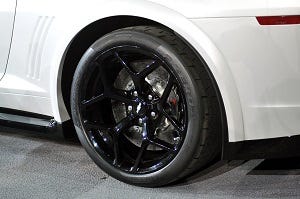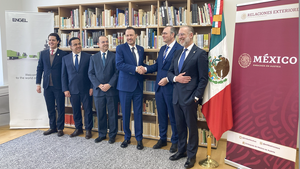Fighting fake resin; the cost of conforming
The recent discovery of use of counterfeit polyamide resin in a key component molded in China for Aston Martin sports cars may be the tip of the iceberg when it comes to such practices but it's not the case that all processors in China can't be trusted. There are honest molders out there going to extraordinary lengths to ensure their operations are completely above-board.
April 3, 2014
The recent discovery of use of counterfeit polyamide resin in a key component molded in China for Aston Martin sports cars may be the tip of the iceberg when it comes to such practices but it's not the case that all processors in China can't be trusted. There are honest molders out there going to extraordinary lengths to ensure their operations are completely above-board.
One such company is Chang'an Casting. Freeman Feng, general manager of marketing, recounted his experiences to PlasticsToday recently. "In the past, we occasionally sourced plastic material from the local market only to discover later that it was fake when we trialled the tool."
|
Camaro wheel flares; sourced from China; resin sourced from US. |
Currently, Chang'an Casting sources material all the way from Pennsylvania for the wheel flares it molds for GM's Chevrolet Camaro Z/28, interestingly also a low-volume sports car. "Yes it takes a long time and it is more expensive together with freight cost, but it's reliable and traceable," says Feng. "Delivery takes 80 days so we have to ask our customer to provide the production plan at least three months' ahead," he adds. Costs for sourcing resin from Washington Penn Plastics and storing it are about 40% higher compared with sourcing on the local market, but still a lot less than the scenario that could result if counterfeit resin sneaked into the system and remained undiscovered for any amount of time.
Romney Mawhorter, President of Astroplas (Bell Gardens, CA), cautions that the cost of importing resin can vary significantly depending on the quantity, material and shipping time (air versus by sea to Hong Kong or Shenzhen, full container load versus less-than-container load, etc.). He does stress that importers of resin should not fudge the value or type of material. "China, unlike the US, checks every single shipment and they know what plastic is and how much it should cost."
While it might be easy for proponents of re-shoring or near-shoring to cite the Aston Martin case as a call for mass-relocation of component production away from China, it would be unfair to paint all processors there with the same black brush.
Due diligence comes to mind when considering sourcing from anywhere, not just China. And as always in business, let the buyer beware. If the deal sounds too good to be true, then it probably won't turn out to be so when all's said and done.
You May Also Like



